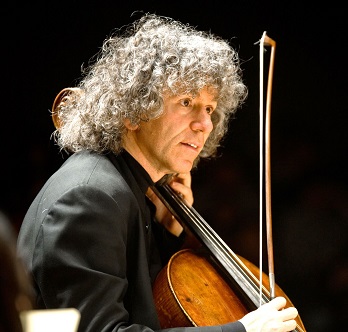 United Kingdom Fauré and Schumann: Joshua Bell (violin), Timothy Ridout (viola), Steven Isserlis (cello), Jeremy Denk (piano), Wigmore Hall, London, 23.3.2019. (AS)
United Kingdom Fauré and Schumann: Joshua Bell (violin), Timothy Ridout (viola), Steven Isserlis (cello), Jeremy Denk (piano), Wigmore Hall, London, 23.3.2019. (AS)

Fauré – Violin Sonata No.1 in A Op.13; Piano Quartet No.2 in G minor Op.45
Schumann – Piano Trio No.1 in D minor Op.63; Fünf Stücke im Volkston Op.102
This was the latest in the occasional series of Schumann/Fauré recitals curated (to use the up to date term) by Steven Isserlis. Apart from Isserlis himself, the artists were completely different from those at the last such event I attended in November (review), and as then the prime mover only took one solo spot. I’m sure that Isserlis has played Schumann’s Fünf Stücke im Volkston more times than he can remember, and his is a completely bedded in, assured and mature interpretation of these quite quirkily invented pieces – more complex than the folky title ‘Pieces in the tone of the people’ might suggest. His grasp of the rhythmic complexities of the third and fifth pieces was complete, and in Jeremy Denk he certainly had a deft collaborator. Best of all was his lovely, singing line in the slow, lyrical second piece.
The evening began with Joshua Bell and Denk in Fauré’s First Violin Sonata, and this proved to be another good partnership. Denk’s immaculately smooth but subtly expressive keyboard style is certainly suited to the refined but passionate musical feelings of the French master, while Bell’s approach was a little more open in feeling and more overtly romantic. This slight difference didn’t matter one bit, since the performance for the most part was satisfying. The opening Allegro molto movement possessed a good deal of positive, uplifting energy and flowed nicely and there was some beautifully hushed playing in the Andante second movement. But Fauré’s rather characteristically bumpy, blunt and offbeat accents in the Allegro vivo third movement simply didn’t register, since the music was played too quickly. Order was restored, however, in the nice, rocking rhythm of the final Allegro quasi presto, though again a little more relaxed, easy going tempo might have again been more effective.
In Schumann’s First Piano Trio one became aware more than before of Joshua Bell’s strong, slightly sharp tone quality. This tended to cut through the texture – partly of course because of the violin’s high range, which generally took it above that of the writing for piano. As a result, Isserlis’s cello tone sometimes didn’t come across adequately, particularly when the piano was playing in the same register. Otherwise the work was given a good performance, with well-judged tempi, well-defined characterisation and some imaginative playing. Perhaps the second movement scherzo became a little bit regimented rhythmically, but otherwise there was much to enjoy.
For Fauré’s Second Piano Quartet the otherwise highly experienced piano trio members were joined by the youthful viola Timothy Ridout, who won First Prize at the Lionel Tertis International Viola Competition in 2016 and appeared by arrangement with the Young Classical Artists Trust. It was at once clear that Ridout felt perfectly comfortable in the company of his senior colleagues, and he produced some notably beautiful playing, particularly in the Adagio non troppo third movement. The performance in general was effective, with the complexities of the first movement clearly unraveled, the agitation of the music near the beginning being particularly well conveyed. The Allegro molto scherzo was fast, compellingly insistent, and the last movement, at times quite vehement in mood, brought the concert to a rousing and satisfying end.
It was a long evening, over two hours of music, and special mention should be made of Jeremy Denk’s contribution to all four performances. They all made considerable demands on his technique and emotional resources, and he seemed as fresh at the end of the concert as he had been at its beginning.
Alan Sanders